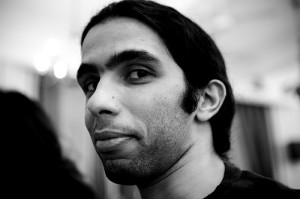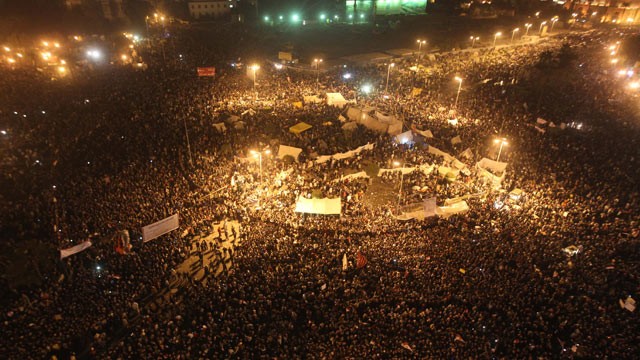By Reem AlMasri
A new Anti-Terror Law was drafted by the transitional Egyptian government this October and is currently being discussed. Although the Egyptian constitution was amended in 2007 to address the need to fight terrorism, a law regulating this amendment has not passed yet. Among many controversial articles and ambiguous definition of acts of terrorism, this draft justified applying “the necessary surveillance on electronic pages and social media platforms to prevent using it in terrorism acts, and uphold anyone using it for criminal purposes.” It also granted the general prosecutors the authority to censor or block electronic websites if used in spreading messages inciting terrorist acts (art 27,28).
Amidst the rise of global debate on the connection of surveillance to security, 7iber spoke with Egyptian activist Amr Gharbeia about the public reactions to the Anti-Terror law  draft and its alleged implications on security.
draft and its alleged implications on security.
Amr Gharbeia is an Egyptian activist and digital security expert based in Cairo, and the former Civil Liberties Director of Egyptian Initiative for Personal Rights.
1. Can you give us a little context for the Anti-Terror draft law? Why now? How will it affect the state of digital rights for the online user in Egypt?
The current counter-terrorism bill is the most recent attempt to further clamp down on the public sphere in Egypt. Egypt’s regimes, old and new, as long as I remember, have introduced more restrictions on free speech and public gathering under the pretext of a war on terrorism. This happened under Mubarak who maintained the emergency status throughout his rule, and since then under both direct military rule, and a military/Islamists partnership.
Such laws are an addition to an already draconian set of legislations and policies that maintain a status of de facto martial laws, starting from the 1937 Egyptian criminal code – which has been an inspiration to legislators across the region, and which directly borrowed articles from Mussolini – to a security apparatus that enjoys practical immunity. Similar excessive bills have always been met with resistance by different groups in the past, and with different degrees of success. Some bills that threatened the right to assembly were stopped during direct military rule, and others were passed under Morsi only to add to a wider public discontent.
Counter-revolutionary groups, from the army to old regime politicians to the Islamists, have been pushing back against the new social powers since 2011 when the public sphere was reclaimed by a sizable part of Egyptians. Part of this public sphere is in cyberspace, hence the digital component in the recent bill, which tries to out manoeuvre due process proceedings in censorship and surveillance. Using vague wording, irregular legal processes, and giving huge power to the government, they are effectively criminalizing the use of the internet. Beginning with the 1914 Demonstration Law, which is still in effect, there has been a long tradition in Egypt of criminalizing perfectly legitimate actions, so that those in power end up choosing who to prosecute.
2. According to a poll done by al Baseera institute, 62% of Egyptians supported the passage of this law. On the other hand,20 human rights civil society organizations from Egypt are rallying to overturn it. How do you explain the wide acceptance of the law despite the great violations it exercises on human rights? Also, if the majority of Egyptians are in favor giving up some liberties to achieve security, why is civil society going against the wishes of the majority?
Many power grabs and cracks on freedoms have popular support at the beginning. This was the case in the burning on the Reichstag in 1933, which lead to Hitler becoming the only power in Germany, as well as 9/11 in our recent past, which paved the way for human rights violations in the name of national security, outside the US as well as inside it. The recently-discovered NSA operation is one result of that.
Egypt, and this applies to the entire region as well, has been caught in the binary of militarism vs Islamism since Nasser’s coup in 1952. Within such a binary, it is expected that one side will use the other to create a narrative to incite the public’s acceptance of revoking freedoms. Majority sentiment and rule do not always align with human rights. Actually, the entire idea of human rights, either in a constitution or in a revolution, is to protect the weak, the marginalized, and the few from the powerful. If majority has an uncontested right to rule, then there should have been no reason to topple the Islamists. Women, the poor, and religious minorities should just accept their fate. This is clearly a fundamentally flawed argument.
There is also experience. If you follow the development to torture for example, all the regime had to do in the early 1990s is to sell the idea that torturing some militant Islamists is OK, because we are in a war. By the end of the 1990s, it became ok to torture an Islamist, militant or pacifist person; it became ok to detain and torture entire neighbourhoods, as we have seen in Sinai after the bombing of tourist destinations. In the end, torture and police brutality were the main spark of the revolution in 2011.
Even if the confiscation of freedoms was a mere political debate and not an issue of human rights, which it isn’t, a minority party with a human rights agenda should not just give up because it lost the vote. Otherwise, there would be no rotation of power and no need for representative democracy altogether.
3. Earlier this year, Edward Snowden leaked documents that revealed mass surveillance practices of US National Security Association around the world. If the US, one of the biggest claimed democracies in the world is doing this to “protect citizens from terrorism” according to NSA officials, why shouldn’t Egypt perform surveillance on its citizens to restore security and fight terrorism, even better, under a legal framework?
The Snowden leaks are a testament to why power should not go unchecked. On several occasions, Keith Alexander, NSA chief, and other high-ranking officials, lied in congressional hearings about the extent and depth of their surveillance operations. This wouldn’t have happened if there was no delegation (delegation is such a popular word in Egypt these days) to fight terrorism no matter the cost to basic freedoms, and if the entire system was not designed to operate in secrecy to begin with.
The 4th amendment to the US constitution, which prohibits surveillance and other search and seizures, is practically non-existent in the digital domain because the NSA has such a massive operation. Egypt has much weaker rule of law compared to the US, but according to the Criminal Procedure Code in Egypt, private correspondence and private spaces have very high protections. The entire argument now, with this counter-terrorism bill or with any cybercrime bill, is that these protections do not extend to private digital correspondence and private digital places. The reason behind singling out the digital and demonizing it is because the internet is actually a much more democratic medium compared to other media. One does not need that much power or money to have a voice on the internet; a much larger group of people can have a voice. It is, hence, more democratic. It is only normal that a police state does not like the internet.
Crime is crime everywhere. Trespassing websites and databases is no different than trespassing lands and buildings. Libel on a blog is no more harmful than libel on television (actually less, since the audience is less, and since people have a higher expectation of credibility on mass media). There needs be no new legislations to criminalise the new medium that is the internet. We have more than enough articles in the current law to punish criminals if we are really concerned about restoring peace, rather than not restoring a more favourable status-quo.
5. In the Arab world, it seems that citizens have made peace with a third party listening to their phone calls. Why should civil society in this region push back on online surveillance now, even though offline surveillance had always been common knowledge?
I disagree with the assumption that citizens of Arab states have made peace with surveillance. Actually, citizens of Arab states follow the advice I would give a group of activists in a digital security training: if you do not own the infrastructure (the phone lines) and you are not personally securing your telecommunications using encryption (a crime in Egypt) then you should assume more people are listening in than you want to.
For a long time we have been told that citizens of Arab countries have made peace with dictatorship; the past few years have proved they haven’t, just like most humans wouldn’t. People will appear not to care about dictatorship or surveillance until they see a moment where it seems possible to change this reality. In fighting a dictatorship, this moment is called a revolution. In surveillance, this moment will come when people see the potential of not only pushing back on surveillance in phone lines they do not own, but in collectively building an alternative decentralised network, that has privacy built-in by design, and that offers telecoms as a right for next to no price. Thanks to all the free software and emerging free hardware around, the technology for this exists today. There will be a moment when its wide use becomes unstoppable.







